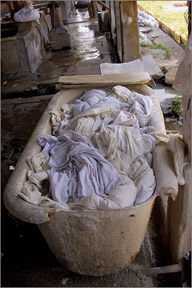Wash day at Wekanda
by Chamitha Kuruppu
 Soaked in the chemical mixed water, they keep rubbing the cake of
soap on dirty linen harder and harder. As the hours pass by, the
carefully piled up linen get less and less. Once in a while they get out
of their 'tanks' for a cup of tea or a smoke. Soaked in the chemical mixed water, they keep rubbing the cake of
soap on dirty linen harder and harder. As the hours pass by, the
carefully piled up linen get less and less. Once in a while they get out
of their 'tanks' for a cup of tea or a smoke.
Amidst the hustle and bustle in the city of Colombo - surrounded by
stylish offices and five star hotels, the Wekanda Municipal laundry
still stands proud. One could hardly believe that a mere 100 meters
interior to Nawam Mawatha Gangarama, exists a colonial era laundry where
tons of linen are hand washed, ironed and neatly folded even without an
electricity supply.
Started by the British in 1820 the Wekanda Laundry is one of the four
laundries situated within the Colombo City limits, which still functions
using the traditional methods of laundering. The other three are located
at Polwatta, Armour Street and Kotahena.
Managed under the Colombo Municipal Council, the laundry shelters
some twenty odd men who makes an income by collecting dirty linen
visiting houses and laundering them. In their late 50s' and 60s' the men
are engaged in laundering as a self employment.
It was in 1958 that Dharmadasa first came to the Wekanda Iaundry. "At
that time we worked for a monthly rent of Rs. 11.25. Until today we have
been paying the same rent," he recalls. Not only the rent the methods
and ingredients used for laundering at this laundry also remain
unchanged. "We only use soap and caustic soda for washing. All the
clothes are ironed with a charcoal iron," explains Dharmadasa.
The laundry has over 30 tanks made in stones. Each worker has his own
tank. In the morning they get into the tank filled with caustic soda
mixed water upto their knee and spend the rest of the day washing piles
of clothes.
The linen is separated; the white and the coloured. White clothes are
soaked in chemical mixed water for a few hours before washing. A coir
brush is seen in the hands of every worker which they use to wash away
the stains on the linen.
The laundry is equipped with 30 small rooms which are used to stock
washed and ironed clothes. "This is where we eat, rest and sleep," says
57 year old Newton pointing to a room filled with linen and has hardly
enough space for a human being to live in.
While we talk with them a couple of luxury vehicles come to the
laundry. Some handover huge bundles of linen while others collect neatly
ironed and folded clothes. "The high class people too come here. Top
offices and restaurants are among our clientele," points out Newton.
"Clients who come in big cars are the most difficult to please," says
Newton. He recalls many incidents where the laundry had to pay huge
amounts of money for damaged linen. "Once, a client demanded us to pay
Rs. 5000 for a pair of pants which was torn while washing," chuckles
Newton.
Initially the laundry employed 200 workers. Over the years the number
has been getting less and less." With all the modern equipment and
methods it is doubtful that anyone wants to engage in this type of
laundering anymore," says Gunawardena. "It seems like we are the last
generation and this kind of laundry is coming to an end," he adds with a
sigh.
However, the last generation of the Wekanda Municipal Laundry is
facing many difficulties due to lack of facilities. "We are yet to get
an electricity connection. We have been ironing with the charcoal iron
for hundreds of years," says Newton. "There is no proper water supply or
a drainage system," he adds.
With all the difficulties and physical inabilities the men slowly get
back to their tanks. Seventy-eight year old Ranaweera aiya the oldest
worker in the laundry shows his legs that are wounded due to chemical
water.
There is no doubt that skinny and petite Ranaweera is physically fit
enough to go through this ordeal day after day. "What else can we do to
make a living? This is all we know" asks Ranaweera.
[email protected] |
